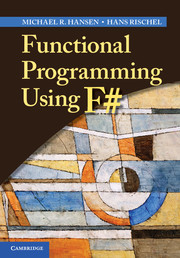Book contents
- Frontmatter
- Contents
- Preface
- 1 Getting started
- 2 Values, operators, expressions and functions
- 3 Tuples, records and tagged values
- 4 Lists
- 5 Collections: Lists, maps and sets
- 6 Finite trees
- 7 Modules
- 8 Imperative features
- 9 Efficiency
- 10 Text processing programs
- 11 Sequences
- 12 Computation expressions
- 13 Asynchronous and parallel computations
- Appendix A Programs from the keyword example
- Appendix B The TextProcessing library
- Appendix C The dialogue program from Chapter 13
- References
- Index
9 - Efficiency
Published online by Cambridge University Press: 05 May 2013
- Frontmatter
- Contents
- Preface
- 1 Getting started
- 2 Values, operators, expressions and functions
- 3 Tuples, records and tagged values
- 4 Lists
- 5 Collections: Lists, maps and sets
- 6 Finite trees
- 7 Modules
- 8 Imperative features
- 9 Efficiency
- 10 Text processing programs
- 11 Sequences
- 12 Computation expressions
- 13 Asynchronous and parallel computations
- Appendix A Programs from the keyword example
- Appendix B The TextProcessing library
- Appendix C The dialogue program from Chapter 13
- References
- Index
Summary
The efficiency of a program is measured in terms of its memory requirements and its running time. In this chapter we shall introduce the concepts stack and heap because a basic understanding of these concepts is necessary in order to understand the memory management of the system, including the garbage collection.
Furthermore, we shall study techniques that in many cases can be used to improve the efficiency of a given function, where the idea is to search for a more general function, whose declaration has a certain form called iterative or tail recursive. Two techniques for deriving tail-recursive functions will be presented: One is based on using accumulating parameters and the other is based on the concept of a continuation, that represents the rest of the computation. The continuation-based technique is generally applicable. The technique using accumulating parameters applies in certain cases only, but when applicable it usually gives the best results. We give examples showing the usefulness of these programming techniques.
We relate the notion of iterative function to while loops and provide examples showing that tail-recursive programs are in fact running faster than the corresponding programs using while loops.
The techniques for deriving tail-recursive functions are useful programming techniques that often can be used to obtain performance gains. The techniques do not replace a conscious choice of good algorithms and data structures. For a systematic study of efficient algorithms, we refer to textbooks on “Algorithms and Data Structures.”
- Type
- Chapter
- Information
- Functional Programming Using F# , pp. 197 - 218Publisher: Cambridge University PressPrint publication year: 2013



